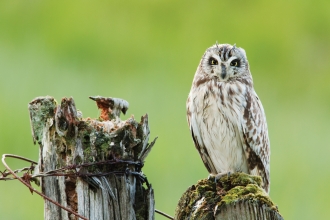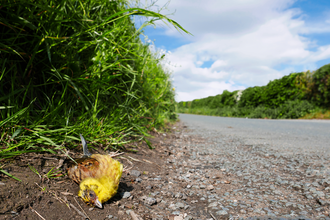Following months of community campaigns and a series of studies undertaken by four regional universities, the Government set up an independent panel last November to advise on further evidence or action to be taken to better understand the cause of these events. There were suggestions by fishers and many from the local communities that the incident was caused by dredging activity in the Tees port, which resulted in the dispersal of historic toxic chemicals buried in the seabed sediments.
A report based on the findings of the panel was published in January. While definitive answers were not expected, the report concluded that it’s ‘very unlikely’ that chemical pollution from dredging or elsewhere caused the die off event and that other possible causes (e.g. an algal bloom) are also ‘unlikely.’ Mention of an unknown pathogen was proposed as one possible explanation, to the surprise of many, having not been suggested as a possible cause in the previous 15 months.
Yorkshire Wildlife Trust have been involved in this case through our advocacy work with local authorities and our membership of the local NEIFCA (fisheries management agency for the region).
Impact on wildlife
Tragically, our marine wildlife is a shadow of what it was decades ago and the North Sea wildlife and habitats are under immense pressure. Our marine wildlife is struggling, and the reasons for this are manmade – over-exploitation, marine pollution and the climate emergency amongst others all contribute. The cumulative impact of these multiple stressors is leading to an arguably less resilient wildlife population.
Therefore, any large-scale event which kills and harms wildlife is deeply concerning. It can have repercussions across an entire food chain – seabirds and marine mammals including whales, dolphins and seals all feed on crustaceans – as well as impacting on livelihoods, and the intrinsic value of nature.
Natural events like 2018’s ‘beast from the east’ weather event and the recent outbreak of Avian flu exacerbate the pressure on an already depleted and stressed system.
We still don’t fully understand the impacts on the shellfish population, or the impact on other species as a result of this mortality event. Nature has an amazing capacity to bounce back but how quickly that occurs and how easy that will be in an environment facing increasing pressure remains to be seen. This ambiguity isn’t good enough for our marine environment or those that depend on the sea to make a living.
Concerns about changes to legislation
This incident and the lack of understanding demonstrates that the current legislative framework isn’t working and isn’t robust enough. It highlights the need for strong and enforceable environmental legislation. The Wildlife Trusts are concerned about the review of the EU’s laws protecting the UK’s environment via the Retained EU Law Bill. Any undermining of current legislation has the potential to loosen regulatory frameworks, underpinned by minimum requirements around evidence provision and monitoring, and is likely to reduce our understanding of what’s happening on land and in our seas.
Our recommendations
In our view the following must happen in order to begin to effectively steward this precious yet pressurised marine environment:
Current incident:
We are concerned and disappointed that we are no closer to knowing the cause of this devasting event and shellfish are still washing up dead on the coastline.
• Continued investigation - As no conclusive answer has been determined, efforts by authorities to understand what is happening must continue, using independently verified data, in conjunction with the development of a long-term monitoring system, until the gaps in knowledge have been filled. Our calls for this will continue.
Future Incident Management:
• Monitoring environmental thresholds - An agreed, early warning system designed to identify potential pollution incidents or other anomalies in our environment would help us understand more from the outset. Such a system would include more extensive and thorough evidence collection and monitoring to help identify causes of such events before it is dispersed.
• Communication protocols - Clear and transparent communication and engagement approach, across stakeholder networks is key immediately after such an event. Good practice from other incident management contexts could be applied for future use.
Prevention:
• Community stewardship - We would welcome a new ‘Tees Management Group’ to be established to oversee stewardship of this stretch of coast and mirror good practise from designated protected sites. This group could bring different interests together and consider the appropriate application of precautionary principle in relationship to the freeport activities to ensure the protection of wildlife following this devastating event.
• Proactive surveying - A comprehensive testing regime is needed of the sediments in the port, conducted prior to dredging, to ensure chemical release from dredged material is not the source of the issue.
• Long term planning - We must make every effort to reduce the additional pressure added by human activities so nature can bounce back in the face of such incidents. This requires careful consideration of how we use our seas, which could be achieved in part through more effective marine spatial planning.
• National policy - The UK needs stronger not weaker environmental legislation – the UK has an opportunity to create stronger not weaker laws that protect our environment and gather evidence, so that we learn from events like this. Regulations needs strengthening but the way the REUL Bill is currently worded, clause 15 specifically states that changes to rules cannot increase the regulatory “burden” to industry, meaning that this Bill can only accelerate deregulation and cannot strengthen protections for nature.
In summary:
We want to see agencies responding with greater urgency to future events that damage or have the potential to damage our environment and wildlife. Crucially, government agencies must work harder together, and more quickly, to understand such events given the impact on environment, species, stakeholders and local communities.
The pressures on our coastline, its habitats and species are intensifying and the knock on impacts to small scale, sustainable businesses that rely on a healthy, thriving marine environment will become increasingly severe, therefore, a proactive and long term approach to stewardship of the wildlife living in and around the freeport is essential.
Help us take action
Currently the Retained EU Law Bill is passing through Parliament, a Bill which aims to remove thousands of EU-derived pieces of legislation by the end of 2023.
A huge number of environmental laws will cease to exist unless a minister decides to keep or amend them individually. The Bill sets out broad powers and short timescales for the Government to do this. There is no indication of which laws will be lost and which will be assimilated into domestic legislation, with or without changes.
Now, more than ever before, we must act to save nature. As a charity, we need your support to protect Yorkshire's wildlife and wild places. Together we can ensure Yorkshire's wild legacy for generations to come.



